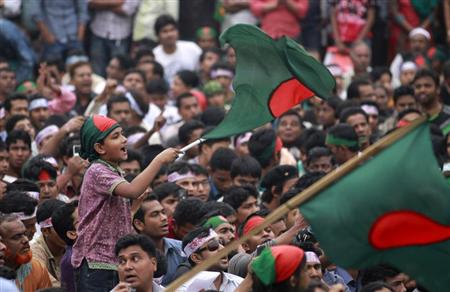
The protesters have
been demanding the death penalty for war crimes after a tribunal this
month sentenced a prominent Islamist to life in prison in connection
with Bangladesh's 1971 war of independence from Pakistan.
The life sentence pronounced on Abdul Quader Mollah, assistant Secretary General of the Jamaat-e-Islami party, for murder, rape and torture had stunned many Bangladeshis.
The amendment will "empower the tribunals to try and
punish any organizations, including Jamaat-e-Islami, for committing
crimes during country's liberation war in 1971", Law Minister Shafique
Ahmed said after the change was approved.Lawyers said the amendment sets a timetable for the government to appeal against Mollah's sentence and secure a retrial. The previous law did not allow state prosecutors to call for a retrial except in the case of acquittals.
Adoption was quick -- less than a week after the amendment was approved by the cabinet in the overwhelmingly Muslim country of 150 million.
OPPOSITION BOYCOTTS PARLIAMENT
Opposition benches were empty as the Bangladesh Nationalist Party (the BNP) of former premier Begum Khaleda Zia and its allies have been boycotting sessions almost since her arch rival, Sheikh Hasina, leader of the Awami League, took office in 2009.
On Sunday, BNP leaders and activists held a rally
outside the party's central office in the capital, calling for the next
parliamentary election in January 2014 to be held under a non-party
caretaker administration."The government is trying to use the protests over the war crime trials to divert attention from critical national issues such as our demand for election under a caretaker authority to ensure a clean and unbiased vote," BNP's acting Secretary-General, Mirza Fakhrul Islam Alamgir, told the rally.
Other BNP leaders urged the demonstrators at Shahbag to speak out against "corruption, politicization of the administration ahead of the polls and tampering the judiciary to persecute rivals."
Hasina and Khaleda have rotated as prime minister of the south Asian country since 1991 and their unending enmity has earned them a reputation as the "Battling Begums."
The two are likely to face off again in the next polls, party officials said.
The BNP also accuses the prime minister of using the war crimes tribunal as a weapon against her opponents. Hasina denies the accusation.
In its first verdict last month, the tribunal sentenced a former Jamaat leader, Abul Kamal Azad, also an Islamic preacher, to death in absentia for killing, murder and torture.
Eight other Jamaat leaders, including its current and former chiefs, are being tried by the war crimes
court that Hasina set up in 2010 to investigate abuses during the 1971
conflict. Three million people were killed and thousands of women were
raped.
The government is facing growing pressure from the
protesters to ban Jamaat-e-Islami, the country's largest Islamist party,
and groups linked to it.Law minister Shafique Ahmed told reporters the government was considering such a ban.
Jamaat activists have called a country-wide strike for Monday, but demonstrators and many shopkeepers have pledged to resist any attempt to enforce such a stoppage.
The authorities deployed paramilitary soldiers in the capital on Sunday evening trying to prevent violence during and ahead of the strike.
Bangladesh became part of Pakistan at the end of British rule in 1947 but broke away in 1971 after a war between Bangladeshi nationalists, backed by India, and Pakistani forces.
Some factions in what was then East Pakistan opposed the break with Pakistan. Jamaat denies accusations that it opposed independence and helped the Pakistani army.

No comments:
Post a Comment